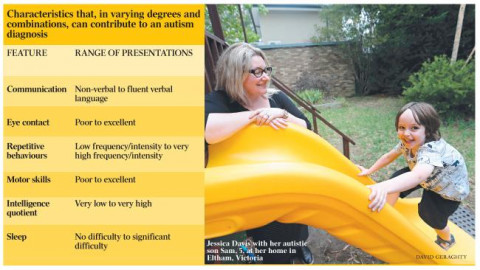
Sam Davis wants to groom elephants when he is older, taught himself to read before the age of five and is autistic.
These are just some of the elements that make the five-year-old who he is, says mother Jessica Davis, who has made it her mission to intervene as little as possible in his condition.
“Something we did from the diagnosis is say: no, this is Sam and this is who he is,” Ms Davis said. “We have tried from day dot to see how he operates in the world — he just has some differences.”
As government agencies grapple with how to define or include autism conditions in support programs, such as the $22 billion National Disability Insurance Scheme, a growing number of families are rejecting intensive interventions for their children.
The Davis family sees these interventions — which require 20 hours or more a week of one-on-one therapy and cost about $50,000 a year — as a forced “cure” for the neurological condition when there are gentler alternatives.
“Sam starts school in a week and we have been having these conversations with the school about not modifying his behaviours: that is Sam, that is who he is,” Ms Davis said.
“Unless they are problematic, unless he is distressed, we let Sam be Sam.”
As the NDIS battles with its own autism experts, many of whom recommend intensive applied behavioural therapy as the gold-standard treatment, Ms Davis said this seemed “too much” for their son.
“It is a huge, huge push to change someone’s behaviour and — to what end? — was the question for us,” she said.
“We are not trying to decide Sam should be normal because what does that mean?”
When Sam was diagnosed he had about 20 words in his vocabulary. He has shown a “willingness” to use spoken language and has received an hour a week speech therapy. He also receives an hour a fortnight of occupational therapy.
“He has a little bit of trouble regulating his body space: he doesn’t understand where his body stops and another body begins, so the OT is good for him,” Ms Davis said.
Sam is hyperlexic — he taught himself to read and accidentally kept it a secret from his parents for months.
He can name animals like a prodigious biologist and listens better when he’s not making eye contact.
When Sam is happy, he beatboxes, recites stories or sings; when he is overwhelmed, he has a tendency to “bolt” or run away. Such differences, his parents say, should be accommodated by the world, not the other way around.
“He can read, he just can and the therapist now does a lot of written instruction with him,” Ms Davis said.